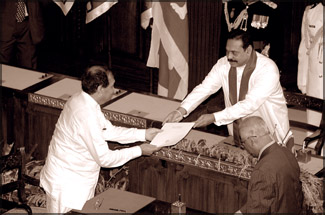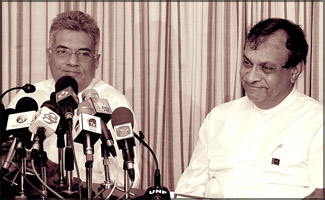Karu Jayasuriya's second somersault
By Sumanasiri LIYANAGE

JAN. 2007: Karu Jayasuriya takes oaths as Minister of Public
Administration and Home Affairs before President Mahinda
Rajapaksa. |

DEC. 2008: Karu Jayasuriya addresses the press after taking over
as the Deputy Leader of the United National Party, in the
presence of the Leader, Ranil Wickremesinghe. |
Karu Jayasuriya made his second somersault a couple days ago. He
justified his first big jump over the fence saying that the President's
hand should be strengthened in order to defeat and eliminate terrorist
threat to national unity posed by the Liberation Tigers of Tamil Eelam.
Now, after the second somersault, he says that the left the Government
to achieve another objective, improvement of the economic management. In
this endeavour he seems to think he should support Ranil Wickremesinghe,
the Leader of the Opposition. One may wonder whether Jayasuriya quite
the Government because he thinks that his objective of joining the
Government, namely, `defeating terrorism' had come to an end. Or does
his resignation mean that this previous objective is supplanted by a new
objective, the management of the economy. What he said at the press
conference at Sirikotha indicates that he goes with the second argument.
I do not wish to ennage in a discussion whether defeating terrorism is
more important than the management of the economy or vice versa. I focus
on different questions. Does the past record indicate that the UNP
possesses a better ability and capacity in managing the economy? Can it
be said that the UNP presents better industrial policies for the
development of the island's economy? Is Ranil Wickremesinghe a better
manager? If one can answer these and associated questions in
affirmative, whatever lacuna exists in his argument, his second
somersault may be justified in the long run. However, I answer those
questions in negative. Economic management at macro level includes
articulation of macro-economic policies including the industrial policy,
the modalities of implementation and the way in which different
regulatory mechanisms are integrated. If I put it in a very simple
language, I posit that that on the first and third levels, the UNP
economic policies in general and policies of the UNP under Ranil
Wickremesinghe in particular are much worse than the economic policies
of the current administration, my multiple criticisms over the current
administration notwithstanding.
The current state of the Sri Lankan economy is an outcome of the
incorrect economic policies in the post 1977 period. The Governments led
by the two main parties adopted the same policy framework and followed
the dictate of the IMF and the World Bank. This is not to say that all
the components of this policy package are bad and wrong, some are
necessary irrespective of the policy framework that is being adopted.
Let me cite one example. Constant and continuous deficit in the Budget
and the trade balance may be detrimental to any economy so that relevant
corrective measures be taken. Cuba experienced massive budget deficit
and sluggish economic growth in the 1990s. The policy makers understood
that budget deficit should be reduced and the inflationary pressure of
the economy be contained. Cuba corrected those economic ills and was
able to increase its economic performance irrespective of the continuous
economic blockade by its 'big neighbour' the US. There is no doubt that
over-regulation of the Sri Lankan economy in pre-1977 period generated
high unemployment, low level capital accumulation and sluggish economic
growth. In that context, some steps towards deregulating the economy
were imperative for the economy to come out of that impasse.
Reactivation of the market was, in such circumstance, a step in right
direction. However, the successive governments were governed not by
'market as servo-mechanism', but by market fundamentalism. By market
fundamentalism, I mean reduction of the total regulation of the economy
to one principle, namely, the market mechanism.
The idea is that deregulated market brings about economic growth,
high employment and lower inflation. Sri Lanka since 1977 has not
followed the steps of the 'developmental State' in East and South East
Asia, but like parrots, repeated mantras of the free and unregulated
market constantly chanted by the international financial institutions.
Not a single country was able to develop its economy following this
free, unregulated market model. Moreover, the current financial crisis
that the Western capitalistic countries have been going through is a
direct outcome of the deregulated capital markets (See my article in
www.lankadissent.lk). Ranil Wickremesinghe tried to implement this
market fundamentalist model in Sri Lanka in 2001 more than any of his
predecessors.
He and his colleagues continuously argue that infamous 'Regaining Sri
lanka' provides the basis for the resolution of all the ills in our
economy. I have my serious suspicion over the justification given for
the first somersault, but I have no doubt that his justification for the
second summersault is absolutely wrong.
When President Mahinda Rajapaksa informed in the introduction to his
budget proposal that "the neo-liberal gloablisation process that was
followed by (Sri Lanka) for over 30 years paid economic dividend only to
a small element of our society", he was absolutely correct. So an
alternative policy paradigm that ensures interlocking balance and
congruence of market, State co-operative and political regulatory
mechanisms is needed to achieve high and balanced economic growth
depending on carefully selected "Growth Augmented Economic Activities"
(GAEA).
Economy cannot be developed by promoting any market-oriented economic
activities or blindly following flawed theory of comparative advantage.
Innovative thinking is need to identify "growth augmented economic
activities", i.e., economic activities that are characterised by
increasing returns, technological growth and cluster effects.
Economic incentives, protection from foreign competition and making
those measures performance based are the most important aspects that the
Government and the private sector jointly work out. One may question the
activities identified by the present government, but the UNP does not
even have such a perspective. UNP stands for non-productionist, trade
based economy.
Ranil Wickremesinghe knew very well that Jayasuriya's argument to
re-join the UNP is not adequate so that at the same press conference he
tried to add that building Sri Lanka entails not only economic
development , but also a different value system.
Nice words! The way in which new posts of the party were allocated by
the 'leader' showed very clearly what he means by this new value system,
a system that lacks transparency, accountability and inner-party
democracy.
One may also refer to the Supreme Court judgement on Dockyard case
filed by Vasudeva Nanayakkara to get some idea about the UNP's economic
management.
(The writer teaches political economy at the
University of Peradeniya.) |
